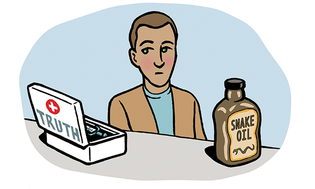 loading
loading
FindingsHow to get people to believe factsA study offers tactics for fighting misinformation.  Gregory NemecView full imageAs far back as the 1950s, tobacco companies knew full well that research had linked their products to diseases that sickened and killed their customers. The industry’s response: deny and discredit the real science, and peddle alternative facts meant to undermine the findings and reassure the public that their products were safe. Thanks to massive public education, few people now believe that smoking is a benign behavior. But for the past two decades, says Justin Farrell, a professor of sociology at the Yale School of Forestry and Environmental Studies, we’ve seen a similar dynamic—this time undercutting the public’s trust in the legitimacy of climate science. “It’s no accident,” he says, “that, as scientists were becoming more certain about climate change, the public was becoming more uncertain. A huge disinformation campaign has been funded by organizations with a lot to lose in a low-carbon economy.” That’s the bad news. The good news, as outlined in a study by Farrell and his research team, is that certain approaches can combat misinformation campaigns: legal efforts, greater funding transparency, and what they call “public inoculation.” The study was published in the journal Nature Climate Change. The way to inoculate the public against misinformation, according to the study, is to expose people to disproven scientific arguments before they hear them from propagandists—and to draw explicit attention to who is perpetrating the falsehoods. The legal strategies the researchers found effective include filing suits against companies that have knowingly misled the public. (They also studied political strategies, but recommended more research.) And legislation supporting financial transparency would expose the huge share of funding for misinformation that comes from donors whose identities are shielded, as well as the enormous resources that fossil-fuel interests are directing toward lobbying. Such legislation, says Farrell, could prevent future misinformation campaigns from gaining traction. “We cannot underestimate the economic influence, institutional complexity, strategic sophistication, financial motivation, and societal impact of the networks behind these campaigns,” adds Farrell.
The comment period has expired.
|
|